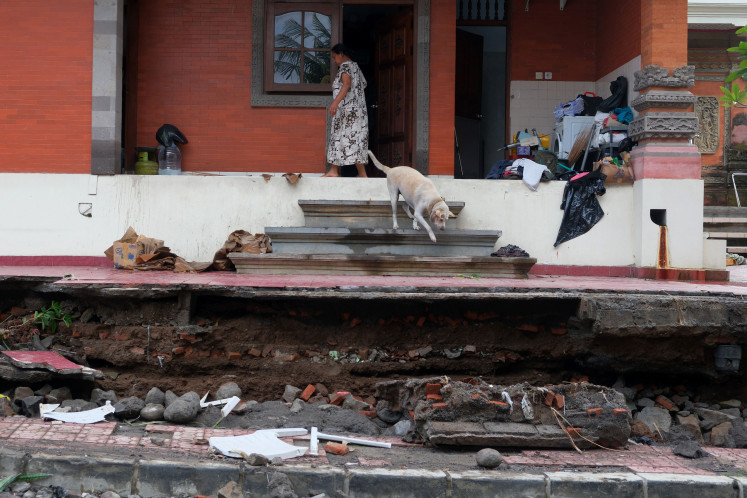Popular Reads
Top Results
Can't find what you're looking for?
View all search resultsPopular Reads
Top Results
Can't find what you're looking for?
View all search resultsClimate change is forever being brushed aside
Discussions on curbing greenhouse gas emissions always seem to proceed excruciatingly slowly, as climate change is forever being brushed aside as a far off concern for a distant future
Change text size
Gift Premium Articles
to Anyone
D
iscussions on curbing greenhouse gas emissions always seem to proceed excruciatingly slowly, as climate change is forever being brushed aside as a far off concern for a distant future. They fail time and again because politicians of all stripes pay more attention to the short-term horizon of the next election than the world future generations will live in. Future generations ' after all ' cannot vote.
That was, until now, the conventional wisdom. It is now becoming increasingly obsolete. New reports show that climate disruptions are already affecting people today, leading to mass migration and threatening food security. Not tomorrow. Not in 2050. Today.
This week, world leaders will meet for the first time in five years to discuss climate change at a special summit convened by UN Secretary-General Ban Ki-moon. It is time they started to reflect this new reality.
Small-scale farmers and indigenous peoples the world over have been experiencing the ramifications of climate change inaction for some time now, as their livelihoods depend heavily on land, water and forests. What's new is that the struggles they face are now becoming obvious to all.
New research commissioned by worldwide organization Oxfam shows how in the five years since world leaders last met in Copenhagen, several major climate disruptions have threatened the right to food on a massive scale, causing ripples of social disruption beyond national borders.
The summer of 2010 was a clear example of this, when a Russian heat wave prompted an export ban on wheat that wreaked havoc on international markets. Price increases particularly affected Middle Eastern wheat-importing countries and contributed to massive social unrest, culminating in the Arab Spring.
The following year, a severe drought in the Greater Horn of Africa led the number of people in the region in need of food assistance to double in a period of six months to 17.5 million. Those two events, combined with the mega floods in Pakistan in 2010 and Typhoon Haiyan in 2013 forced around 25 million people from their homes.
Developed countries need to commit to at least US$15 billion over the next three years.
The upcoming climate summit is an opportunity for world leaders to show that they understand both the science and the urgent need to act in order to reduce the risk of large-scale social disruptions in the years to come.
One concrete step forward they can and should take is to replenish the UN-backed Green Climate Fund ' designed to help poorer countries deal with the effects of climate change and curb their own carbon emissions. To send a clear signal that they are serious about taking action, developed countries who have done most to cause this crisis need to commit to at least US$15 billion over the next three years.
Such a commitment would prepare the ground for all countries to agree on binding greenhouse gas emission cuts. China and the United States now appear willing to move in this direction even before an international agreement is reached.
Europe will also have an opportunity to lead by example when deciding its 2030 climate and energy policy in October.
If they agree to slash emissions by at least 55 percent, reduce energy use by at least 40 per ent and source 45 percent of the EU's energy from sustainable renewable sources, they will strongly encourage people in all countries to demand more from their governments.
Despite this, emissions targets will achieve little if trade flows continue to increase and provide an easy escape route for countries to outsource pollution abroad. This 'carbon leakage' sabotages climate change negotiations by allowing governments to make toothless and benign pledges.
Furthermore, in their Transatlantic Trade and Investment Partnership (TTIP) trade negotiations with the US, the EU may lift restrictions on exports of natural gas and oil, releasing vast amounts of greenhouse gas emissions.
Unless the trade agenda is aligned with the climate change agenda we will continue to lie both to ourselves and the next generation.
The good news is that in the past, only a few visionary politicians ever talked about climate. Now, even the most short-sighted cannot ignore that society's expectations are mounting. The public understands that to ignore climate change is to remain blind to the sufferings of entire populations and to accept the risk of social disruptions on a large scale. Democracy used to be seen as the problem ' it is now our best hope that the political systems will finally respond.
___________________
The writer, the former UN special rapporteur on the right to food, is an honorary advisor to Oxfam International.










